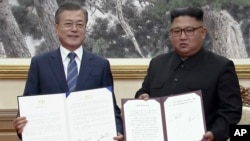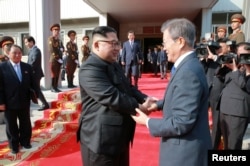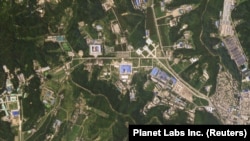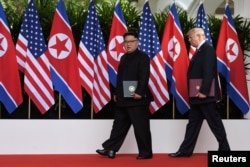The leaders of North and South Korea Wednesday hailed a series of agreements they said were aimed at turning the Koreas into a "land of peace without nuclear weapons and nuclear threats." North Korean leader Kim Jong Un and South Korea's Moon Jae-in Wednesday issued the pledge at a summit in the North's capital, Pyongyang.
During the talks, Pyongyang also announced it would permanently dismantle its key missile site at Dongchang-ri in the presence of international observers, but the North still has other facilities. Furthermore, it was announced that “contingent upon corresponding measures by the United States,” North Korea would permanently dismantle the Yongbyong nuclear facility, and take other unspecified actions.
Analysts point out, however, that specific details remain absent and a path to denuclearization is not clear.
Lacking specifics
“At first glance and amidst the pomp and circumstance, the document [Panmunjom Declaration] is expansive and breaks new ground in inter-Korean relations. But, upon reflection, much has been covered in previous agreements in 1972, 1992, 2000, and 2007,” writes Bruce Klinger, senior research Fellow at the Heritage Foundation, in an email message to VOA.
Separately, Harry Kazianis, director of defense studies at the Center for the National Interest, notes that the official theme for the third inter-Korean summit is Peace, A New Future. He says with the Panmunjom Declaration, progress appears to have been made on that front.
Kazianis said it would have been nice to see Kim declare his nuclear arsenal or give up a nuclear weapon to the International Atomic Energy Agency as an outcome of the summit; but, Kazianis notes Kim is a shrewd negotiator. “I think what he [Kim] did, which is natural, is he did the bare minimum to keep the process going with the United States.”
Analyst Michael Madden echoed another perspective regarding the interests of the two Koreas.
Speaking to the Reuters news agency, Madden, an analyst at the Stimson Center's 38 North policy research group in Washington, said, "I don't think President Moon got everything he was seeking from these interactions, but Kim Jong Un gave Moon some tangible things for which he can take credit.”
Kazianis concurred. “[Moon] didn’t get a touchdown, but he got a first down,” Kazianis said, using American football terms to describe progress made so far.
Sanctions pose obstacle
The two Koreas also announced a number of joint initiatives. These included construction projects to link railways and roads on the east and west coasts. In addition, when the appropriate conditions are met, North and South Korea indicated they will move to resume operation of the jointly run Kaesong Industrial Complex and tours to the North's Mount Kumgang resort, as well as establish a west coast joint special economic zone and an east coast joint special tourism zone.
“President Moon makes economic promises he can't deliver without U.N. and U.S. acquiescence to accepting blatant violations of U.N. resolution sanctions and U.S. laws,” writes Klinger.
"Washington was already irritated with Moon's unbalanced approach of eagerly striving to improve relations with Pyongyang without a commensurate demand for progress in denuclearization,” he said.
“Sanctions are a problem,” said Kazianis, “But the only way the sanctions are going to be lifted is [that] Kim needs to make major progress toward denuclearization... so it’s a carrot ultimately.”
Second Trump-Kim summit?
President Moon will travel to New York next week for the United Nations General Assembly, where he will meet with U.S. President Donald Trump on September 24. The South Korean leader said Wednesday he looked “forward to North Korea and the United States resuming their dialogue soon, based on the achievements of this Pyongyang summit.”
Moon promised that South Korea would continue to help facilitate dialogue so that Washington and Pyongyang will “hold another summit as soon as possible and find a middle ground to reach an agreement.”
“The Trump administration will now be faced with a dilemma of enforcing principles and risking strained relations with Seoul or getting on the euphoric peace train,” Klinger writes.
Klinger said he believes a second Trump-Kim meeting will occur.
Kazianis agreed, but added it could be a trilateral summit with Moon, or even a quadrilateral meeting with Chinese President Xi Jinping, because Moon hasn’t revealed everything regarding Kim’s plans to denuclearize.
“I think [Moon] understands that he needs to hold some things close to the chest to be able to bring to Donald Trump, maybe additional concessions...Maybe Kim Jong Un made some other proposals that we don’t know about today, and that makes sense,” said Kazianis.
Klinger opines, “The Pyongyang Declaration furthers North and South Korean interests, which under President Moon Jae-in, are becoming synonymous, but not U.S. objectives.”















